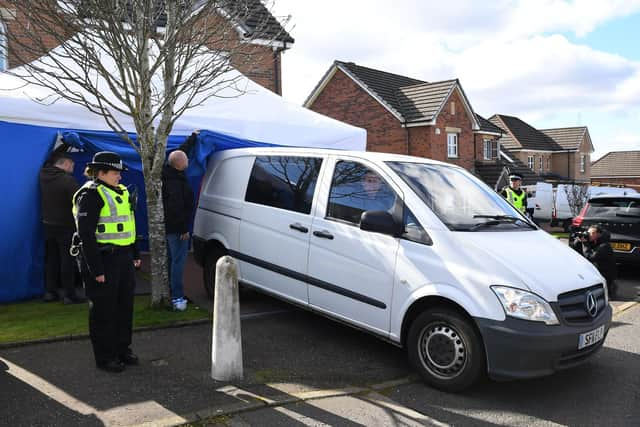Nicola Sturgeon arrested: The most dramatic twist yet in Operation Branchform probe into SNP finances
The news dropped at 2.26pm precisely, setting up the most dramatic twist in Operation Branchform, the long-running investigation into SNP finances.
A press release from Police Scotland revealed simply that a 52-year-old woman had been arrested as a suspect in connection with the ongoing probe. That woman of course was Nicola Sturgeon, Scotland’s former and longest-serving first minister.
Advertisement
Hide AdAdvertisement
Hide AdIt is impossible to over-estimate the seismic political ramifications which will follow from this development. It is the moment the SNP has been dreading.


For current incumbent Humza Yousaf, who has struggled to wrestle the news agenda away from the finance probe since entering Bute House, the headache of trying to distance himself from the scandal just became much harder.
Just hours earlier he had appeared in a showpiece interview on the BBC’s Sunday with Laura Kuenssberg show.
During it, he revealed he had spoken to Ms Sturgeon recently and said she is “in a good place and doing well”.
He continued: “Why would I not want to get some advice from arguably one of the best politicians, the most impressive politicians, Europe has seen over the last couple of decades?”
His interview would go on to discuss independence – admitting that it was not yet the settled will of the Scottish people – and the prospect of a deal with Labour after the next general election, warning that the SNP could make life difficult for Keir Starmer’s party. Headlines on another day, but consigned to the cutting room floor a mere four hours later. The news agenda was once again taken out of Mr Yousaf’s hands.
Operation Branchform began in 2021 looking into allegations £600,000 raised for campaigning towards Scottish independence was diverted elsewhere. It did not, however, fully explode into public consciousness until April this year with the arrests of Nicola Sturgeon’s husband – and former SNP chief executive – Peter Murrell and then party treasurer Colin Beattie.
Both men were released without charge pending further investigation.
Advertisement
Hide AdAdvertisement
Hide AdAs well as the arrests, searches were carried out at a number of properties, including Mr Murrell and Ms Sturgeon’s home – where a police tent was erected in the garden – and SNP headquarters in Edinburgh. A luxury camper van thought to be worth around £110,000 was also seized as the inquiry continued..
Some close to the party – including its former head of communications, Murray Foote, and ex-Sturgeon aide Noel Dolan – viewed the actions of police as heavy handed.
But speaking recently, Chief Constable Sir Iain Livingstone defended the probe.
“Operation Branchform has been a long-going investigation,” he said.
“Police Scotland were asked to look at a number of assertions that were being made – we always do that, it is our duty – then we seek evidence to see if there is any substance in them.
“Then, as matters progress, at an appropriate time we discuss that with independent prosecutors under the Crown Office and Procurator Fiscal Service.”
The senior officer – who is due to leave the post in August – added: “When we carry out the search we will put processes in place that are proportionate and necessary to the action being carried out and to the inquiry and its terms, and I am satisfied that the steps we have taken are proportionate and necessary.
“Stating opinion or speculation without having the knowledge and information that exists is damaging… because it infringes the rights of individuals.
Advertisement
Hide AdAdvertisement
Hide Ad“Operation Branchform has integrity, it is expected to have rigour. If the operation had not been pursued I would rightly have been accused of neglect of duty.”
Asked specifically about the tent erected in the front garden of the former first minister, which became a famous image illustrating the turmoil engulfing the SNP, the Chief Constable said: “I was aware of it and was supportive of it because I knew the circumstances and the rationale for utilising it, and part of it was to protect rights of individuals.”
The arrests in April came just after Ms Sturgeon stepped down as both first minister and SNP leader after more than eight years in the job. She insisted the investigation had no bearing on her decision, instead she had known in her “head and heart” that the time was right to go.
During her Bute House press conference, she was asked if she expected to be interviewed in relation to the investigation. She said she did not.
She spoke then of the “brutality” of life as a politician, as she insisted the “time is now” for her to go.
Ms Sturgeon had made history as the first woman to become first minister, and was also the longest-serving incumbent in that post – dealing with no fewer than five different Conservative prime ministers in her time in the job.
Ms Sturgeon, who joined the SNP at the age of 16, became first minister in November 2014 after predecessor Alex Salmond stood down in the aftermath of the independence referendum that year.
Such was her popularity that just after taking over as SNP leader she addressed a sell-out crowd at Glasgow’s Hydro – an achievement usually reserved for pop and rock stars.
Advertisement
Hide AdAdvertisement
Hide AdMembership soared, so that at one point under her leadership the party was the second largest in the UK, and in the 2015 general election the party enjoyed record-breaking success, winning all but three of the 59 seats up for grabs north of the border.
For Mr Yousaf, and the wider SNP, all that must seem very far away today as further developments are awaited.
